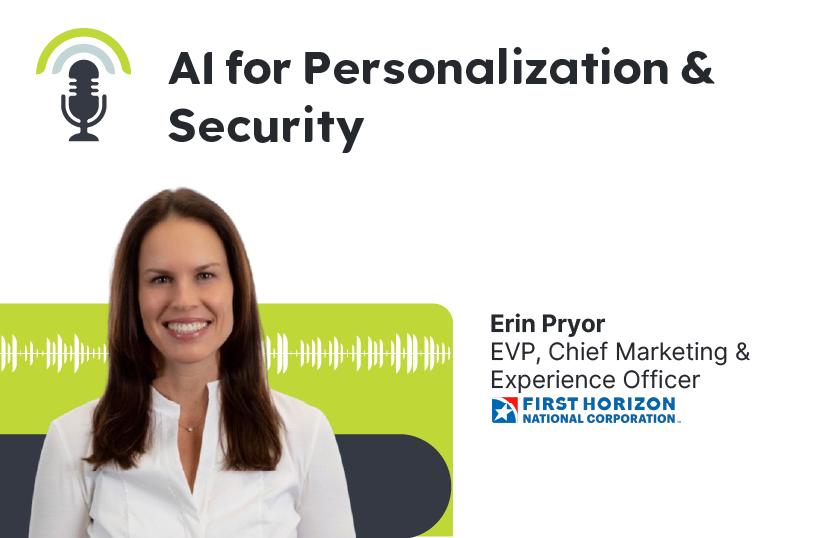Shownotes
This Sunny Side Up podcast episode features an interview with Erin Pryor, the Chief Marketing Officer of First Horizon Bank. She discusses how AI is transforming marketing strategies in the banking industry, focusing on personalisation, content creation, and fraud protection. Pryor explains how AI can enhance customer experiences while respecting privacy. She also shares lessons learned from her background in volleyball that relate to teamwork, communication, and accountability. The interview provides insights into the challenges and opportunities AI brings to financial services.
Best Moments
-
When Erin expresses surprise at finding her career in banking after starting in journalism.
-
When she shares lessons learned from playing volleyball in college that relate to teamwork and communication.
-
When Erin discusses how AI may lead to more personal interactions by enhancing conversations between bankers and customers.
-
Her perspective on both challenges and opportunities AI brings regarding privacy/security concerns in banking.
-
Advice she gives on disagreeing respectfully and focusing on common goals, which stems from her sports background.
-
Where Erin encourages listeners to connect with her for more insights on her career path and views on AI in banking.
About the guest
Erin Pryor serves as the Chief Marketing Officer for First Horizon Bank and is responsible for corporate-wide marketing, brand management, and client experience. She leads a team that creates and executes marketing and client experience strategies, supporting the bank’s brand and business objectives. With over 20 years of experience in the finance, banking, and media industries, Erin has demonstrated success in businesses of all sizes, from start-ups to Fortune 100 enterprises.
Prior to joining First Horizon, Erin led the brand and go-to-market strategy development for USAA Bank.
Key takeaways
– First Horizon Bank uses AI to increase personalisation and deliver more relevant messaging to customers.
– AI is being implemented cautiously in the financial services domain and is primarily used to enhance existing marketing and customer experiences rather than replace human interactions.
– AI helps analyse customer data and behaviours to provide predictive insights and recommend the next best actions.
– Privacy and security are top priorities when using customer data and AI due to the sensitive nature of financial information.
– AI can enhance fraud protection by detecting abnormal spending patterns or potential fraudulent activities.
– The relationship between customers and their bankers remains central, with AI aimed at providing bankers insights to serve customers’ individual needs and goals better.
– Erin sees potential for AI to increase personalisation at scale while maintaining trust through responsible data practices and respecting customers’ preferences around invasive marketing.
Quotes
“And so we’re looking at it more to enhance what we do, like marketing. Marketing can be used in any industry, but banking specifically is highly regulated. The privacy of our clients is critical, the trust is super important.”
Erin highlights how regulation impacts AI adoption in banking due to the importance of privacy and trust.
Highlights from this episode
How has AI transformed marketing strategies in the banking/financial services sector?
AI has transformed marketing strategies in banking by increasing the speed at which data can be ingested and used, allowing for more relevant one-to-one messaging. Erin noted that machine learning and AI have been used in programmatic advertising for some time. However, more opportunities exist to implement AI tools into the daily customer experience to enhance prospects’ and clients’ understanding. AI can analyse more data to provide predictive insights and recommend the next best actions to bankers and customers.
How is First Horizon Bank using AI for personalisation, content creation, and fraud protection while respecting privacy and regulations?
First Horizon Bank uses AI to enhance personalisation on its website so that when customers visit and look at certain things, their future messaging will be more tailored. AI insights also help bankers have more informed conversations with customers.
AI has provided outlines for content creation, but a human touch is still needed. AI helps detect abnormal spending patterns or potential fraudulent activities for fraud protection.
Erin stressed that privacy and security are top priorities, and they have governance around data use. As a regulated industry, banking adoption of AI is more cautious. They are thoughtful in testing applications to respect customer privacy and maintain trust.
What challenges and opportunities does AI bring to the banking industry regarding privacy/security concerns?
Erin noted that AI brings challenges and opportunities to the banking industry regarding privacy and security concerns. A key challenge is effectively addressing those concerns when using customers’ financial data with AI. Banks have a responsibility to protect sensitive data.
However, she also sees opportunities for AI to enhance brand safety and fraud protection by leveraging data to identify and prevent fraudulent activities. With proper governance and controls, AI could help keep customers more secure while using data insights. The challenge is balancing these benefits with privacy, as banks must maintain customer trust.
How can organisations effectively address potential privacy or security issues when using AI?
Erin emphasised the importance of having strong governance around data use and being thoughtful in how AI applications are tested and utilised. She said First Horizon Bank takes data responsibility very seriously. Effective ways for organisations to address potential privacy or security issues with AI include:
– Establishing clear policies and oversight on data collection, sharing, and retention
– Conducting privacy and security risk assessments of any new AI systems
– Implementing controls like access restrictions, encryption, and auditing
– Being transparent about how customer data is used and respecting preferences
– Training employees on privacy and security best practices with AI
Does she see AI enhancing personal interactions or replacing them, given the importance of relationships in banking?
Erin did not see AI as replacing personal interactions in banking, given the importance placed on relationships. She explained that their focus remains on the relationship between the customer and their banker. AI aims to enhance those interactions by providing bankers insights into customers’ needs and goals so they can better serve them. While AI may increase personalisation at scale, Erin views the technology as a way to support the human relationships central to banking rather than replace face-to-face meetings or conversations between customers and their bankers.
Resource recommendations
The Morning Brew newsletter for quick business news hits each day.
Fortune CEO Daily newsletter for insights on leading companies.
Bucket List-ening podcast to learn about the career path and stories of First Horizon Bank’s clients.

We have updated our Privacy Notice. Please click here for details.






